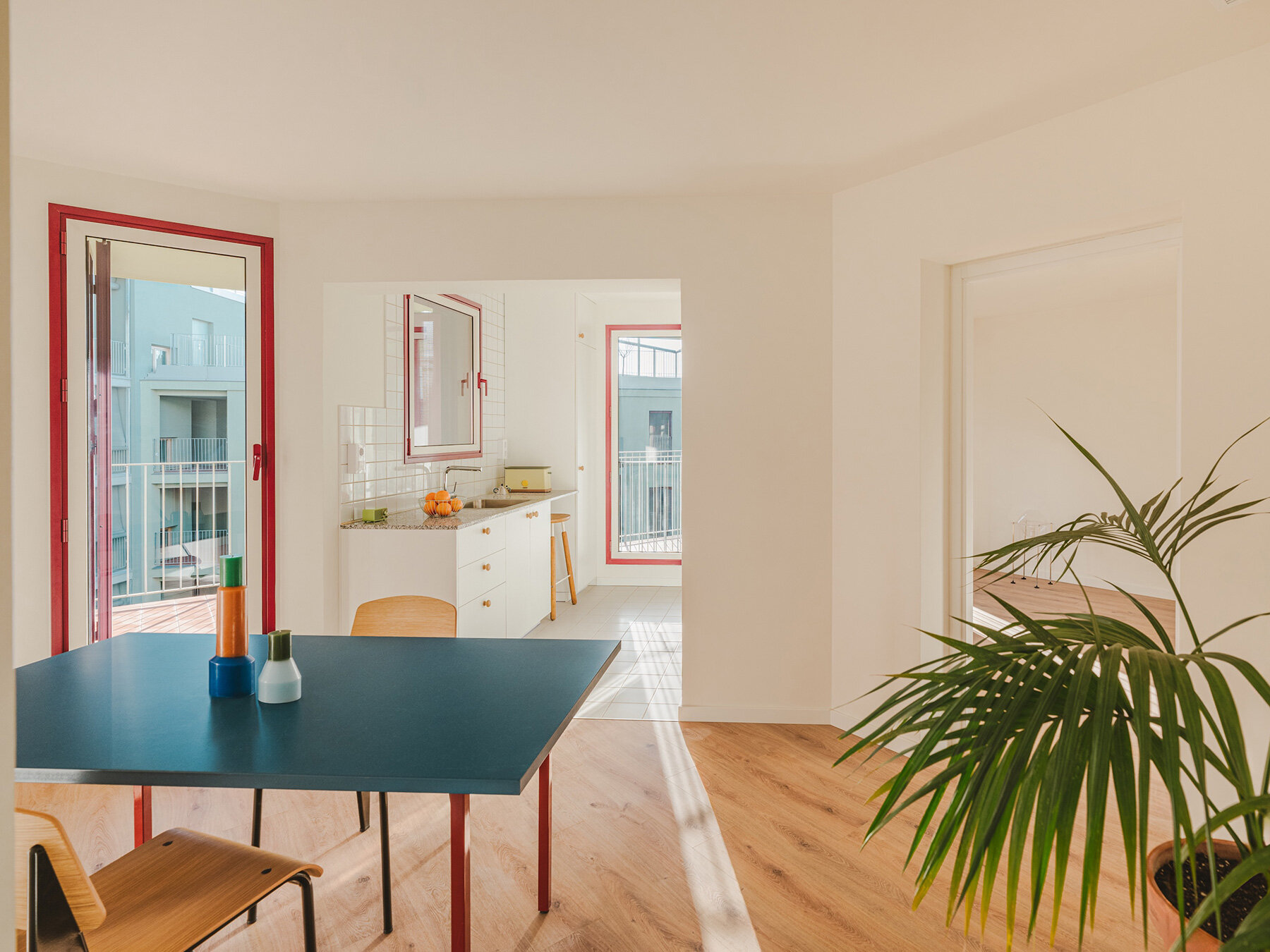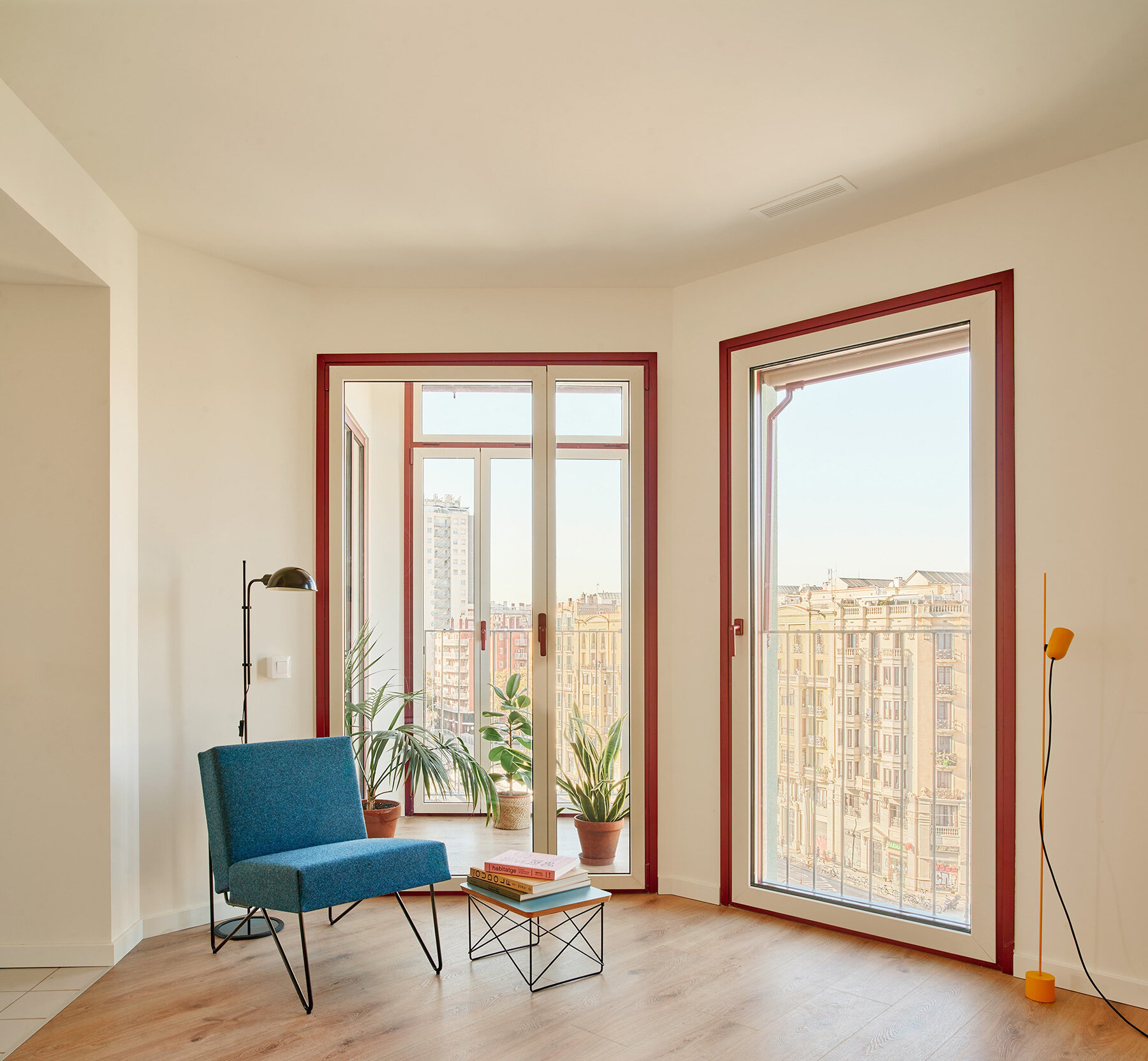Cierto Estudio introduces inclusive living model in Barcelona
In the heart of Barcelona, where the city’s historical fabric meets the innovation-driven 22@ district, architecture firm Cierto Estudio brings a radical vision for collective housing to life with The Room Community, part of the larger Illa Glòries redevelopment. As Building A within a four-block ensemble designed by multiple architectural teams, the dwelling introduces a new model for modular, inclusive living. Comprising 51 units surrounding generous common areas, the design supports adaptable living, social equity, and sustainable practices. ‘We are incredibly proud of the Illa Glòries project. It represents a new model for urban living, one that prioritizes community, sustainability, and the well-being of its residents,’ says Cierto Estudio.
What sets The Room Community apart is its full-spectrum approach to care, both social and environmental. From its cross-laminated timber (CLT) structure and passive climate strategies to its robust green infrastructure, with more than 60% of the plot being landscaped, the building meets NZEB standards while mitigating the urban heat island effect. At the social level, the project is conceived from a gender perspective, with strategies that support caregiving, safety, and shared responsibility. Wide, south-facing communal walkways double as balconies and connect homes to a rooftop garden, a shaded climate refuge and social platform that strengthens neighborly ties.

images © Jose Hevia, unless stated otherwise
dismantling the nuclear family through open, fluid typologies
Winning an international competition in 2017, Cierto Estudio, a practice founded by six women architects, proposed a housing typology that dismantles conventional domestic hierarchies. Their design challenges the nuclear-family norm, offering homes that are neutral in function yet rich in possibility. The layouts are fluid, with rooms of equal size and value, encouraging occupants to define how they live. Kitchens are no longer hidden or confined to traditional gender roles; instead, they are reimagined as open, social areas, visible from the entrance and integral to daily life. Sightlines stretch diagonally across apartments, while intersections between spaces create physical and visual continuity, allowing autonomy and collectivity to coexist.

Cierto Estudio unveils collective housing project The Room Community
The Room Community rethinks visibility as tool for spatial justice
The name of the project, The Room Community, hints at its spatial philosophy, centered on a modular system of square rooms, rotated and interconnected to create typologies without hierarchies. The central junction in the floor plan serves as a main organizing element, supporting adaptable configurations for diverse and evolving household structures. With no room dominating and no single function being fixed, the idea of home is elastic, evolving with the people who inhabit it.
Rather than isolating individual units, the building opens them to shared courtyards and balconies in a contemporary reinterpretation of the corrala typology, a traditional Spanish housing model characterized by multi-story buildings with dwellings facing inward toward a common courtyard or gallery. These communal spaces make way for spontaneous interaction and collective oversight, aiming to reduce gender-based violence by increasing visibility and mutual vigilance.

designed as Building A within a four-block ensemble led by multiple architectural teams
what public housing can be when design leads
Commissioned by the Institut Municipal de l’Habitatge i Rehabilitació de Barcelona (IMHAB), the development represents a forward-thinking approach to public housing in a city facing growing affordability challenges. In a moment when housing is increasingly commodified and standardized, Illa Glòries signals what can be achieved when public institutions back thoughtful, community-oriented design. The collaboration between teams, including Cierto Estudio, Bayona-Valero, Cantallops-Vivente, Haz Arquitectura, and others, creates an urban block that is diverse and coherent at the same time. Alongside homes, ground-floor commercial spaces and pedestrian connections make the neighborhood more vibrant, knitting the new development into the dynamic rhythm of Barcelona.

comprising 51 units surrounding generous common areas

the design supports adaptable living, social equity, and sustainable practices

south-facing communal walkways double as balconies and connect homes to a rooftop garden | image © Marta Vidal

the central junction in the floor plan serves as a main organizing element | image © Marta Vidal

a contemporary reinterpretation of the corrala typology | image © Marta Vidal

the name of the project, The Room Community, hints at its spatial philosophy

a modular system of square rooms, rotated and interconnected | image © Marta Vidal

no room dominates, and no single function is fixed | image © Marta Vidal

kitchens are no longer tucked away or gendered spaces | image © Marta Vidal

the layouts are fluid, with rooms of equal size | image © Marta Vidal

occupants define how they live
project info:
name: The Room Community – Illa Glòries
architects: Cierto Estudio | @ciertoestudio
location: Plaça de las Glòries, Gran Via de les Corts Catalanes, Barcelona, Spain
site area: 5,000 square meters
total built area: 35,000 square meters
design team: Marta Benedicto, Ivet Gasol, Carlota de Gispert, Anna Llonch, Lucia Millet, Clara Vidal with Mariana Gomes
collaborator: Franc Llonch
client: Institut Municipal de l’Habitatge i Rehabilitació de Barcelona (IMHAB)
construction company: SACYR
wood structure assembly: Velima
CLT supplier: Xilonor
landscape architects: Beatriz Borque + Miquel Mariné
structural engineering: Bernuz-Fernández Arquitectes S.L.P.
MEP engineering: Eletresjota Tecnics Associats S.L.P
environmental consultancy: Societat Orgànica +10 SCCL
acoustic consultancy: Àurea Acústica S.L.
construction management: Ángel Gil
photographers: José Hevia, Marta Vidal | @_martavidal
The post modular housing by cierto estudio makes space for equity and shared life in barcelona appeared first on designboom | architecture & design magazine.

